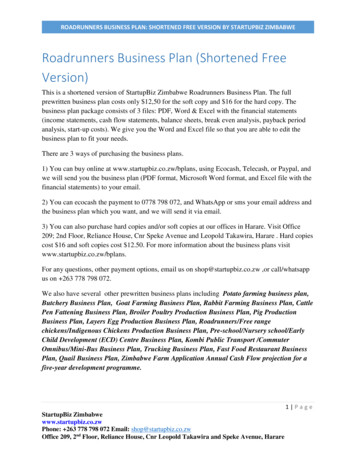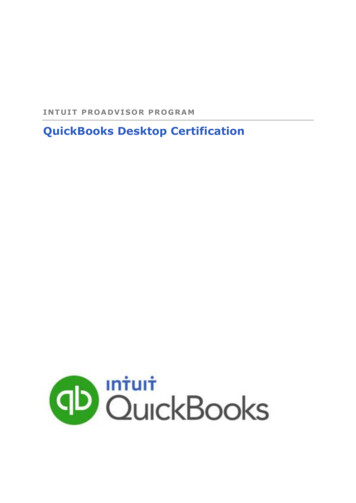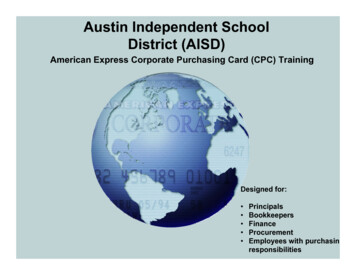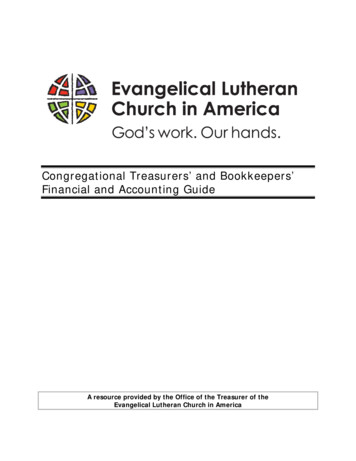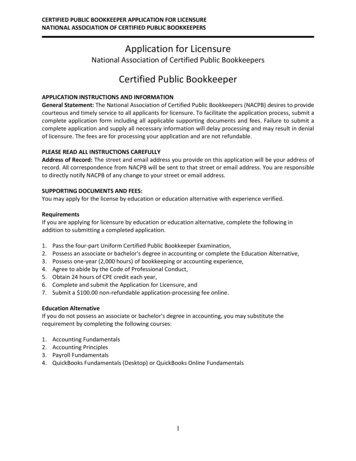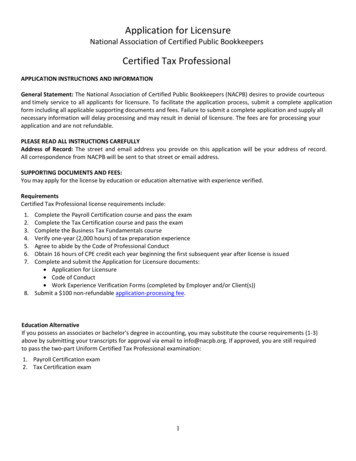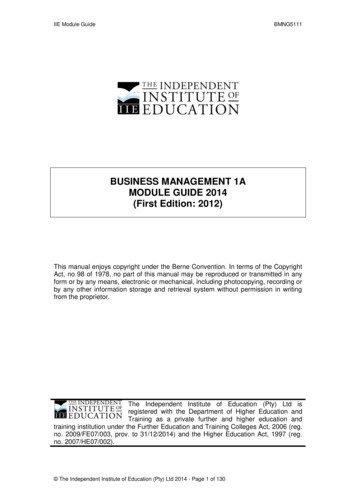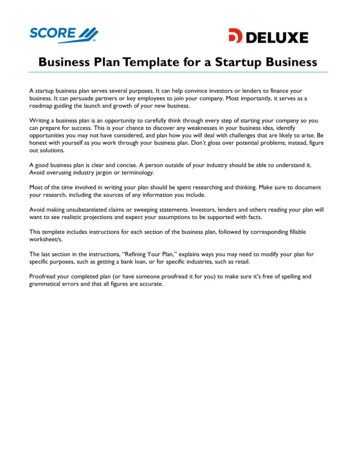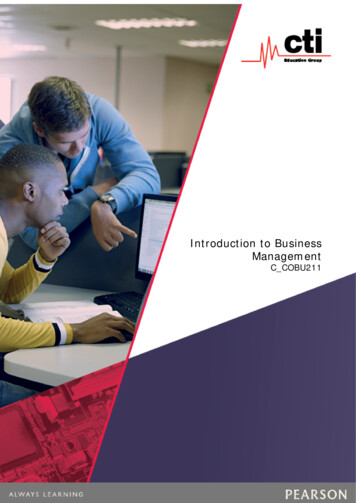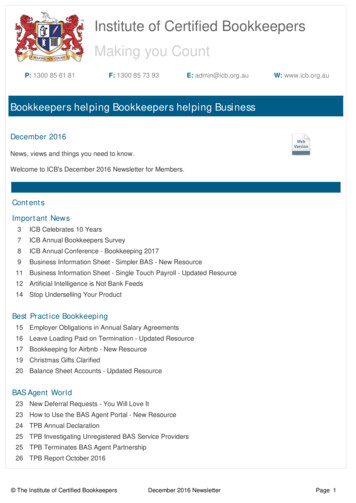
Transcription
Institute of Certified BookkeepersMaking you CountP: 1300 85 61 81F: 1300 85 73 93E: admin@icb.org.auW: www.icb.org.auBookkeepers helping Bookkeepers helping BusinessDecember 2016News, views and things you need to know.Welcome to ICB's December 2016 Newsletter for Members.ContentsImportant News3ICB Celebrates 10 Years7ICB Annual Bookkeepers Survey8ICB Annual Conference - Bookkeeping 20179Business Information Sheet - Simpler BAS - New Resource11 Business Information Sheet - Single Touch Payroll - Updated Resource12 Artificial Intelligence is Not Bank Feeds14 Stop Underselling Your ProductBest Practice Bookkeeping15 Employer Obligations in Annual Salary Agreements16 Leave Loading Paid on Termination - Updated Resource17 Bookkeeping for Airbnb - New Resource19 Christmas Gifts Clarified20 Balance Sheet Accounts - Updated ResourceBAS Agent World23 New Deferral Requests - You Will Love It23 How to Use the BAS Agent Portal - New Resource24 TPB Annual Declaration25 TPB Investigating Unregistered BAS Service Providers25 TPB Terminates BAS Agent Partnership26 TPB Report October 2016 The Institute of Certified BookkeepersDecember 2016 NewsletterPage 1
Continued Professional Education26 This Month From the ICB CPE Page26 ICB Technical Webinar - The Bookkeeping Cycle - End of Month26 ICB Technical Webinar - Review of Payroll Entitlements26 ICB Technical Webinar - The Bookkeeping Cycle - BAS26 ICB Technical Webinar - The Bookkeeping Cycle - End of Year PreparationICB Network Meetings27 December 2016 Question of the Month - How to Encourage a Client to Move Forward27 November 2016 Question of the Month - GST on Processed and Unprocessed Milk - ICB's Response28 Upcoming Network MeetingsOther Things Happening in the World29 Public Holidays in VictoriaThis Month From the ICB30 ICB Christmas 2016 Closure Notice30 Call for Fellow Membership Nominations30 What's New this Month from ICB31 December 2016 eBrief - Client NewsletterProducts and Solutions31 Major Features Released for Reckon One in 2016From the ATO32 ATO Private Rulings33 Upcoming Portal MaintenanceICB Membership StatisticsICB Supporters and SponsorsICB Staff, Management and Directors would like to wishyou and your familya relaxing and peaceful Christmas anda safe and happy New Year.We would like to take this opportunity to thank you for your continued support aswe strive to raise the bar for professional bookkeepers.The ICB administration offices will be unattended from 4pm on Friday, 23rdDecember, 2016 until 8am on Tuesday, 3rd January, 2017 (AEDST) and wethank you in advance for your patience during these times. The Institute of Certified BookkeepersDecember 2016 NewsletterPage 2
Important NewsICB Celebrates 10 YearsICB officially started in February 2006, and this year we celebrate ten years of dynamic development as an institutein the constantly evolving world of bookkeeping.Matthew’s CommentsIn 2006 the software companies MYOB and Reckon dominated the Australian SME space. Xero began its journey alittle later in the year and Intuit came to Australia with QBO a few years later. At this time the partners of softwarecompanies had established themselves and we had begun to look for the next level of endorsement and credibilityof the bookkeeping profession.The Australian Government was continuing its very long review of the tax agent regime, (13 years I think it hadbeen going). Between 2006 and 2009 bookkeepers needed strong representation into Treasury to assist in theestablishment of the new Tax Agent Services Act 2009 and, therefore, the creation of registered BAS Agents.At the same time ICB Global had made contact with me and a few other players in the Australian industry. Theplanets aligned and ICB Australia was born.We look forward to the next ten years of ICB Australia’s evolution and the developments that are coming our way inthe bookkeeping industry.Highlights from the Ten Year Journey2006 Matthew embarked on two trips around Australia presenting “State of the Bookkeeping Industry” and theconcepts of ICB to over 3,000 people.ICB’s first part-time employee joined Matthew.The first newsletter was published in July 2006 at a whopping two pages long!The first three online general bookkeeping assessments were “up and running”.By the end of the year, ICB had admitted 282 members. The Institute of Certified BookkeepersDecember 2016 NewsletterPage 3
2007 John Birse was appointed as director.The first ICB “explanation paper” was released on the topic of BAS Service Providers.The first annual survey was conducted.August 2007 saw the first wave of membership renewals with an 89% rate of renewal - a rate that continues.The first versions of the ICB practical bookkeeping assessments were released, titled “ICB ShoeboxAssessments”.The ATO released the new portal for BAS Service Providers.The first Certificate IV in Financial Services (Bookkeeping) became available.ICB offered a professional email address to all members holding a practising certificate:yourname@goodbookkeepers.com.auThe ICB website averaged 3,000 hits per day with over 240 unique visitors each day.Bookkeeper Search function was launched, (now called Find a Bookkeeper).2008 Regional network meetings were started, the first locations being Burnie (TAS), Devonport (TAS), Balcatta(WA), Gold Coast (QLD) and Hobart (TAS). Tasmania led the way in enthusiasm for networking.ICB was invited to join the advisory group for the Australian Treasury Standard Business Reporting.June saw the release of draft legislation for the new BAS Agent regime: “We are now called BAS Agents”.Information sessions on the new BAS Agent regime were held around the country in Adelaide, Perth,Brisbane, Sydney and Melbourne.Membership renewal gifts were sent out for the first time: “Thank you so much for your MembershipRenewal Gift. What a thoughtful present! Now I can look like a true professional; it was a pleasant surprise,although my membership is worth every penny on its own”.ICB was appointed as the industry expert to advise on professional partner members in the MYOB PartnerConnect events around Australia.2009 ICB membership reaches 1,000 during January.ICB made a formal submission to the Senate Economics Committee regarding the new Tax Agents ServicesBill 2009. The TASA 2009 became law in March.“A Day to Remember - 2009 Information Sessions” were held in ten locations around the country, with 354total members in attendance.The new Tax Practitioners Board was established to replace the various state based tax agent boards.The ICB practical assessments were recognised as accredited units towards the Certificate IV in FinancialServices (Bookkeeping).MYOB began formal sponsorship of ICB’s network meetings around Australia, which continues to date.Tax Agent Services Regulations released along with the first explanatory statements from the TPB.2010 ICB published information on the development pathway for aspiring BAS Agents and guides to completingthe BAS Agent application forms.ICB released a new version of the Code of Professional Conduct.The TPB accredited ICB as a Recognised BAS Agent Association under the TASA 2009.MYOB engaged ICB to provide the assessment knowledge and expertise behind the MYOB ApprovedBookkeeper program.Transitional arrangements for BAS Agents are put in place.Insurance Made Easy were appointed as the preferred insurer for bookkeepers - and they still are.ICB membership reaches 2,000 during July.Amanda Linton was appointed a director of ICB. The Institute of Certified BookkeepersDecember 2016 NewsletterPage 4
2011 First annual conference for ICB held, “Stepping Out in 2011”, with nearly 800 attendees in nine locations.ICB Bookkeepers Forum up and running, available to anyone in the bookkeeping community - within amonth there were over 1,250 topic views of the discussion posts.Question of the Month was started as a section in each newsletter - still going!ICB professional name badges are offered to all members.The ICB website now averaged over 13,000 hits from nearly 9,000 unique visitors each month.August saw the release of the first eBrief newsletter for members to send to their business clients.The first ICB Member Guide was printed and mailed to all members.Membership reached 3,000 during October.ICB Global celebrated 15 years of service to bookkeepers and was named as Professional Institute of theYear in the UK.Products and Solutions specifically for bookkeepers offered on the ICB website.2012 Nearly 900 people attended the annual conference, “Transformation ofBookkeeping”.Deborah Thompson presented the first network meeting via webinar still going strong and now with two webinar meetings each month.Podcasts of the members’ newsletter started.ICB awarded the first Fellow level memberships.From the first newsletter being 2 pages long, the newsletters are nowover 40 pages on average.ICB presented the End of Year June workshops for the first time atfour locations with over 200 people attending.The first newsletter podcast was issued, being read by Deborah Thompson.The first Annual Skill Review assessment was released, drawn on resources in previous newsletters.ICB started producing and presenting technical webinars for members on practical bookkeeping andindustry current topics.2013 The conference “Today’s Bookkeeping Towards Tomorrow” had over 1,000 attendees.Monthly technical webinars commenced.LinkedIn company page was created, and ICB started actively posting in Twitter and Facebook as well.The first ICB Advisory Board was gathered together. The advisory board continues to meet regularly todiscuss current issues and advise ICB management on direction and policy.One page “click-through” newsletter now offered as an alternative to the full newsletter.Launch of the BAS Supervisory Agent (BASSA) program, connecting experienced and ICB accredited BASAgents with new bookkeepers who are starting the journey towards becoming a registered BAS Agent.ICB has representation on educational advisory boards IBSA (Innovation and Business Skills Australia),FCAC (Finance Sector Advisory Committee) and NTAN (National TAFE Accounting Network).2014 Conference attendance continued to increase, with over 1,100 attending “Essential Learning, EssentialKnowledge”.ICB started major project of software feature comparison (to be completed over the year).TPB released registered agent symbol, a great development for the professional standing of registeredagents.New look ICB website launched.ICB Forum included a members’ only section.The expanding ICB team moved to bigger offices.Membership reached over 4,000 during September. The Institute of Certified BookkeepersDecember 2016 NewsletterPage 5
2015 “Bookkeeping Now and the Future” was the theme of this year’s conference, with over 1,200 attendees.ICB CPE register was launched, allowing members to track all their professional education activities in theone place.ICB Global wins best international association award.ICB and the ATO present a joint webinar on the ATO’s approach to debt.New Facebook group was launched: members only ICB Discussion and Support Group.The first Global Bookkeeping Week was initiated, inspiring bookkeepers around the world to acknowledgethe great work we do for business owners.Membership reached over 5,000 during October.ICB technical support team is expanded to include members from around the country working remotely.2016 “Bookkeeping 2016” conference had over 1,400 attendees.June workshops with an end of year focus continue to be run in several locations around AustraliaThe newsletters now have a total of over 12,000 subscribers to all versions, as well as over 3,300subscribers to the newsletter podcast.Business Support Program was launched.Membership reached 6,000 during April.Rick Freitag was recognised for contribution to ICB and the industry with the first ICB Lifetime Membershipaward.Mel Power was awarded a Certificate of Recognition for “significant contribution to the growth anddevelopment of the bookkeeping community”.MYOB was awarded a Certificate of Appreciation and Recognition for “the support, sponsorship andcommitment to the development of the bookkeeping profession and to ICB Australia (2006-2016)”.The team of staff is now 16 employees and contractors around Australia - we would not be where we arewithout the contributions of all current and past staff.There are now 74 network meetings around the country, run by ICB members.The website now has nearly 95,000 hits per month on average, with 64,000 unique visitors.The LinkedIn company page now has nearly 6,000 followers and a reach of over 7,000 per week onaverage; Facebook has around 2,500 followers and an average reach of over 6,000; and Twitter currentlyhas nearly 2,000 followers and nearly 15,000 impressions per month.Directors ReportAmanda Linton saw Matthew present at a MYOB event in Melbourne in early 2006 and joined as an ICB membersoon after. She was invited to be a director late 2010. She sees ICB’s major contribution to the industry as beingthe dedication to developing the Tax Agents Services Act 2009, and the related BAS Agent professionaldevelopment. The ICB resource development has also come a long way, giving real practical benefit to themembers. ICB has been instrumental in raising the professional profile of bookkeepers from being unqualified andunregistered to being a legitimate and respected part of the tax agent regime. She says “I love this industry. We arethe backbone of the SME industry”.Before the inception of ICB, John Birse was active in the bookkeeping franchise networks and working to raise thestandards of bookkeeping. John was introduced to Matthew after having seen him at MYOB events, and he wasinvited to be a director in early 2007.John enthusiastically highlighted what he sees as ICB’s great achievements: The role of ICB in the Tax Agent Services Act 2009.Establishing professional standards for the bookkeeping profession and developing relevant skill sets forBAS Agents.Involvement in policy and decision making at government level. The Institute of Certified BookkeepersDecember 2016 NewsletterPage 6
Visiting places like Darwin, Newcastle, Cairns and Tasmania to reach our members, not only the capitalcities.Network meetings around the country are a fabulous initiative to educate members and share informationamongst professional peers.Australia is emerging as a significant player in the global market and standards of bookkeeping, and ICB isa major contributor to this.ICB is the premier strategic partner for everyone in the industry - from student bookkeepers to BAS Agentsto the ATO to government departments.Agree with everything we do or with some of it, ICB has been and will continue to be a significant change agent, aresource, an informer and an advocate for professional and Certified Bookkeepers. “Bookkeepers helpingBookkeepers helping Business”. A great community.ICB Annual Bookkeepers SurveySurvey Closes 31 December, 2016The 2016 Annual Bookkeeping Survey provides information to you about yourworld with questions such as "How many bookkeepers are actually using bankfeeds?" "How many bookkeepers charge their clients for travel time?" "Howmuch are bookkeepers charging?"From 615 respondents so far, we can report that about half of you engage employees and about a third engagecontractors, Only a third of you are satisfied with the financial return of your business. Over half of you have been inbusiness for over eight years. We encourage anyone who has not yet participated in the survey to do so now beforeit closes on 31 December. We look forward to finding out the current state of affairs for more of you - contract andemployee bookkeepers both!ICB provide the independent survey results to government, software companies and the education sector to assistthem to understand the reality of the bookkeeping profession. Help us to help them!Which survey is right for you?Contract Bookkeepers providing services to multiple clients:Access the Bookkeepers in Business SurveyEmployed Bookkeepers providing services to one clients:Access the Bookkeepers in Employment Survey The Institute of Certified BookkeepersDecember 2016 NewsletterPage 7
Results will be published in January. You do not have to be an ICB member and you do not need to log in. Weanticipate the survey to take approximately 15 minutes to complete. We do not capture your email address for anysubsequent marketing without your permission. Everything you say is totally confidential.Pass the link on to any colleagues, employees or even your accountant to complete, as the more information wecan get, the better. You can access the past years results here.If you are having any problems accessing the survey, please contact us at admin@icb.org.au. We know your timeis valuable, so we really appreciate your response.ICB Annual Conference - Bookkeeping 2017Make a note in your diary for The 2017 Bookkeeping Conference - Bookkeeping 2017Register NowTo register for Bookkeeping 2017, please click the location you wish to attendHobartWednesday 1 March, 2017Hotel Grand Chancellor1 Davey Street, HobartBrisbaneTuesday 7 March, 2017Royal International ConventionCentre600 Gregory Terrace, Bowen HillsCairnsWednesday 8 March, 2017Shangri-La HotelPierpoint Road, CairnsDarwinThursday 9 March, 2017Rydges Palmerston15 Maluka Drive, PalmerstonAdelaideTuesday 14 March, 2017Adelaide Convention CentreNorth Terrace, AdelaideCanberraWednesday 15 March, 2017Hotel Realm18 National Circuit, Barton The Institute of Certified BookkeepersDecember 2016 NewsletterPage 8
PerthThursday 16 March, 2017Crown PerthGreat Eastern Hwy, BurswoodMelbourneTuesday 21 March, 2017orWednesday 22 March, 2017Melbourne Park Function CentreBatman Avenue, MelbourneSydneyMonday 27 March, 2017Sydney International ConventionCentre321 Kent Street, SydneyFor full details regarding Bookkeeping 2017, please click here.Business Information Sheet - Simpler BAS - New ResourceThe New World of GST Codes – Simpler BASGST or Not IncludedThe ATO has simplified the GST reporting system to make it simpler for a business to conduct its trading with lesscomplexity in applying the GST law.To trade in Australia a business must:1. Obtain an ABN.2. Decide whether to register for GST, (compulsory once your turnover is more than 75,000pa for a business,or 150,000 for Not-for-Profit entities. Transport providers must register regardless of turnover).3. Understand what sales the business makes and how GST is to be applied to those sales.4. Understand what GST the business pays on its expenses and know how much GST it is allowed to claimback.Simpler BAS System When conducting business or doing the books: Code sales where GST applies to the “GST” code. Code expenses that have GST you are allowed to claimback to “GST” code. All other sales and expenses can be coded to “NotReportable” or “Excluded” codes. On each BAS, report the amount of GST collected in 1A and theamount of GST to be claimed back in 1B. Report the total of all sales in G1, (report this value from theprofit and loss for the same period). The Institute of Certified BookkeepersDecember 2016 NewsletterPage 9
Tax Codes and Reporting FieldsIt will no longer be required to report export sales, GST free sales, capital purchases or non-capital purchases onthe BAS.You will still need to report PAYG Withholding, PAYG Instalments, Wine Equalisation Tax, Fringe Benefits Tax,Fuel Tax Credits and Luxury Car Tax if required for your business.You and / or your bookkeeper may still choose to use multiple tax codes for reporting and/or auditing purposes;however, the BAS reporting will be simplified.You are still required to keep all records as required by the ATO to validate all business transactions.Who does it Apply to?Under the new “Small Business” definition, any business with turnover below 10m will lodge the new Simpler BAS.When?Simpler BAS system starts on 1 July 2017.Why?Simpler BAS has been introduced because of the complexity of applying GST law to business i.e., different types ofsales have different types of GST classifications; the same goes for expenses. The BAS reporting has requiredallocation of every sale between one of at least six different reporting options and expenses between sevenoptions.The allocation between these reporting classifications has been inaccurate and does not alter the amount of GST tobe paid or claimed. Government are simplifying business by allowing a business to report with a basic system thatis closely aligned to just getting on with doing businessWhat to do When making a sale do you have to charge GST? Code it to GST, code everything else to notWhen incurring expenses, did you pay GST that you can claim back? Code it to GST, code everything else to notConsult with your registered BAS Agent Member of the ICB to apply Simpler BAS to your business. The Institute of Certified BookkeepersDecember 2016 NewsletterPage 10
Business Information Sheet - Single Touch Payroll - UpdatedResourceYour Payroll seen by the ATO . All YearThe Single Touch Payroll (STP) legislation has passed through Parliament. It is law and is going to happen!Who?All “substantial” employers, (more than 20 employees by headcount), must participate. The count happens as of 30 April each year. You must enter STP as of 1 July 2018.Anyone can elect to enter STP earlier.What?You submit payroll and superannuation data to the ATO each “PayEvent”.A PayEvent is each time you pay someone and should be generating a pay slip. Someof the data on the pay slip is now sent to the ATO. The year-to-date totals of gross wages and gross tax for each employee beingpaid.The amount of Superannuation Guarantee that has been accrued.Superannuation payment information is also sent at the time of paying yourSuperannuation Guarantee Contribution, (SGC).How?Your payroll software should do it all for you.If you do not have accounting software or internet, the ATO are considering other reporting mechanisms.When?The ATO is required to be ready to receive STP information as of 1 July 2017.Substantial employers must provide STP information from 1 July 2018.Other employers are not required to provide STP information at this time.Any employer can enter STP as soon as they are able.Why? The ATO will gain greater visibility of all employers, enabling earlier activity to ensure the employer ispaying their PAYGW and their SGC.The employer will not be required to provide payment summaries to their employees.The ATO will prefill tax returns with the payroll information.The ATO will make the payroll information available to employees all year through myGov. The Institute of Certified BookkeepersDecember 2016 NewsletterPage 11
FutureThe ATO will streamline the process for a new employee by automating the Tax File Number Declaration andSuperChoice form into payroll software and myGov.NoteThe employer’s payroll records are the “source of truth”. Therefore, any amendments to past pays, or any fixesrequired are updated in the employer’s records and at the next PayEvent the ATO receive the updated information.There is no need to go back and amend past PayEvents.The employer will still have to “finalise” a payroll year by indicating to the ATO that the information they are nowbeing sent is the final version and can be used for tax returns.Artificial Intelligence is Not Bank FeedsThe best use of our contemporary accounting software is to use it as the business administration andprocess system. The accounts and GST just happen behind the scenes.Some businesses are creating their accounts in a process where they only code from a bank statement. Someaccountants create the accounts not from the business processes but from the bank records. This isn’t the best useof the “intelligence” that we have available to us in our existing software.Using bank feeds in this way ignores the business process and only notes that someone has been paid, (it’s on thestatement), and the bank feed brings that into the software for allocation. This system creates the transaction in thesoftware after the event and as a separate process. This technique is great for rescue jobs, (catching up thecreation of accounts for a business that is way behind). This technique does use machine learning techniques, (insome cases), by the software observing coding behaviours and recommending what the next code could be.It could apply rules that have been previously set up. One of the downsides is that this accounts creation process isseparate to the business processes, therefore every transaction of the business has been performed once whenthe business process happened, and again when the accounts are being created.Comparison to Business ProcessThe business process would have the placement of the order or the receipt of the invoice already in the system.Therefore the obligation to pay the supplier’s invoice is already entered into our accounting / business software. Wecan then control who we owe what and when to pay. A business typically has to pay suppliers by some consciousprocess conducted by humans. (I don't know of too many businesses that would allow a computer to automaticallyjust pay their supplier’s bills, neither should they). We hit a few buttons and indicate to the software to send apayment message to the bank; alternatively we create an ABA file for upload to the bank. The smart software hasalready allocated the expense when the invoice was received and already recorded the payment in the softwarewhen the supplier payment message was sent.This process changes the use of bank feeds. Bank feeds don’t create the transaction; the bank feed verifies what isalready in the business records. The smart software looks in the transactions already recorded in the bank andmatches the bank feed data to the software. It then looks for anomalies in amounts and would highlight that it can’tmatch the items. It would provide the list of items not already in the system.In this better use of bank feeds, we have removed a duplicate set of processes. The business did its thing and hadalready created the accounts. Bank feeds then verified the transaction. The Institute of Certified BookkeepersDecember 2016 NewsletterPage 12
Documents Have to ExistThe possibilities opened up by artificial intelligence in thesoftware also highlight the dissection of responsibilities andexpectations by the bookkeeper and business owner.Unfortunately many are using bank feeds as the sole system forcreating accounts. We are seeing accountants jump into usingbank feeds as the ‘next best thing’ and for some it is a massivejump forward in their efficiency. Instead of manually coding apaper statement and having someone process it into acomputer, the bank feed software does that in a fraction of thetime. This highlights that the reliance on bank feeds alone tocreate the accounts is removed from the existence or reliance on the source documents, (invoices and receipts).The accountants typically have buried in their terms of engagement that it is the responsibility of the businessowner to keep all the necessary invoices and records of what has gone on in the business. They use the banktransactions as a means of pulling together the accounts based on assumptions that the records exist.The bank statement or bank feed alone is not necessarily sufficient documentation. Bookkeepers need to advisethe clients of the obligation to keep documents and to retain tax invoices and then agree on who is responsible forensuring that system is in place. In many cases it is the bookkeeper’s responsibility.Bookkeeping is Not Just Bank Feed ProcessingThere are commentators and some accountants believing that bookkeeping is dead because they don’t understandthat we do far more than just code from statements, we actually help the business with all aspects of what they do.When some accountants are saying "We can do the bookkeeping for less", what they are actually saying is, "Wecan use bank feeds to auto-code the transactions". Our response should be "Well, that would be a step backwards.We already use bank feeds in this business to verify the transactions that were recorded as the business actuallyconducts their natural business process.”Note: Software should be used as the business tool and the accounting / GST / tax happens as a result. The bankfeed should match against transactions already entered.I note there are many accountants and many business owners who could do with bookkeepers to help them tounderstand the most efficient use of software and bank feeds.Maybe Bank Feeds is Part of Artificial IntelligenceIt is the accounts happening ‘behind the scenes’ that is the current application of Artificial Intelligence to our world.We conduct the business in the software: we issue the invoices or make the retail sales, we process the payroll, wereceive supplier invoices and we make the payments to suppliers. All those business processes conducted in thesoftware are part of us or the business people doing the business which, because of the development of computerassisted processes, is also doing the bookkeeping.Part of artificial intelligence is the concept of “machine learning”. This is described as the machine learning whatyou would have done manually and processing it for you. Is this “auto-coding”?Artificial or automated intelligence could help us with better review and certainty. We have been using the basicimplementation of computerised processes for years. The next version is the machine / computer learning what ourother behaviours have been in the past and then reviewing current behaviour. The machine will also highlightchanges, possibly altering or amending transactions, but also reporting things to be checked or anomalies to beaccepted.Related References ICB - Artificial Intelligence and Bookkeeping The Institute of Certified BookkeepersDecember 2016 N
8 ICB Annual Conference - Bookkeeping 2017 9 Business Information Sheet - Simpler BAS - New Resource 11 Business Information Sheet - Single Touch Payroll - Updated Resource . Bill 2009. The TASA 2009 became law in March. . 2016 “Bookkeeping 2016”
